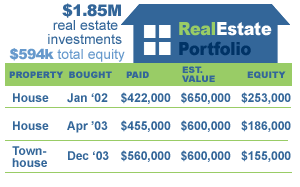 |
|
| Joe Becherer, in the sun |
BEND, Ore. (CNN/Money) – We first heard about 1st Lt. Joe Becherer from his friend, who emailed us shortly after they were both deployed to Afghanistan.
"I am a regular reader of your Tycoon in the Making' column," wrote 1st Lt. Andy Hattman. "After reading it for the last couple of months I am compelled to tell you of a friend of mine, Joe Becherer, whose story, in my opinion, surpasses anything that I have read thus far."
We were intrigued. So we contacted Joe, who is currently the disbursing officer for the Bagram Air Field, just north of Kabul, and asked if he'd be willing to share his story and provide documentation of his real estate holdings.
Several emails, an overnight package from Joe's parents, and two echoing long-distance phone calls from Afghanistan later, we weren't disappointed.
The 25-year-old has nearly $600,000 in equity invested in real estate worth an estimated $1.85 million.
Basic training in real estate
Joe started saving and investing young. He opened his first mutual fund account when he was a junior in high school and – thanks to a lot of hours babysitting and a thriving stock market – graduated with a $15,000 nest egg.
In 1998 he left his hometown of Wauwatosa, Wis. to study economics at the United States Military Academy at West Point.
In exchange for committing to five years of active duty after graduation, Joe got a free education and a $600 monthly stipend, most of which he invested in a Roth IRA.
"Joe had an almost myth-like reputation as being an investing guru and a trusted source of advice on personal finance matters," wrote Andy, who was at West Point with Joe. He was "constantly working on some sort of business-related project."

During his junior and senior year at the academy that project was real estate. "I felt like I had done as much studying [in school] as I could and the only way I could learn more and grow as a 'businessman' was to actually purchase a piece of property," said Joe, who read articles online and checked out real estate books from the library.
When the time came to choose where he wanted to be stationed after graduation, Joe – whose class rank allowed him first dibs within his branch – chose the Schofield Barracks, near Honolulu.
It wasn't just the great weather that attracted him to Hawaii. The island of Oahu also seemed like a ideal place to own rental property. "There is a high concentration of military on the island who only stay for a couple of years at a time," said Joe, who started talking to his Hawaii-bound classmates about renting early on.
Staking out Hawaii
Although housing prices on Oahu are considerably higher than the national average, Joe wasn't discouraged.
He shopped around for a month before deciding to focus on the west side of the island, which is just now being developed. In January 2002, six months after graduation, Joe signed a contract to buy his first house – a five bedroom, three bathroom house in a new development on the west side of Oahu – for about $420,000.
Coming up with the 20 percent down payment was not a problem.
After years of saving and investing, he left the academy with close to $50,000 in his investment accounts. To add to the nest egg, his parents gave him a generous graduation gift – the $40,000 they would have contributed toward Joe's college tuition had it not been free.
Finally, in the six months following graduation – during which time Joe collected a salary had very few expenses – he managed to sock away another $20,000.
While the house was under construction, Joe served a five-month stint in the Philippines. The following August he closed on the house and moved in with Andy and Greg, another friend from West Point.
As the housing market in Hawaii became more competitive, many builders based new home orders on lotteries. In April 2003, Joe put his name in a lottery to buy a second home just before leaving to Thailand for a three-month tour.
A week later he got word that his name had been chosen. "I stayed up for a week straight trying to make sure it made financial sense," said Joe, who put 20 percent down on his first house but planned to use a home equity line of credit to finance his second house.
In the end, he decided the house was worth the $455,000 price and the $90,000 equity line against his first place. "The contract was signed on my 24th birthday," said Joe, who gave Andy power of attorney to sign the contract on his behalf.
Shortly after returning from Thailand, though, Joe learned he'd be deployed yet again – this time to Afghanistan for one year beginning in April. With his second house still under construction, Joe brokered a deal with Greg, his roommate in his first house, and the other renters.
"I told them I'd give them a deal on the rent if they finished the landscaping," said Joe. "They moved in the day after I closed."
A sight for sore eyes
Shortly before his second house was finished, Joe toured a town home in the Ko Olina Resort and Marina, a beach front development known for its lagoons.
The developer was selling its model unit, which was fully furnished and upgraded, for $560,000. Although pricey, it was exactly the kind of place Joe wanted to return to after serving his time in Afghanistan.
To sweeten the deal, the builder agreed to rent the unit – to continue showing it as a model – until this summer, at which point a property manager will rent it out until Joe returns from Afghanistan next April. "This is one place I'd like to hold onto," said Joe.
 |
YOUR E-MAIL ALERTS
|
Follow the news that matters to you. Create your own alert to be notified on topics you're interested in.
Or, visit Popular Alerts for suggestions.
|
|
|
Joe manages his real estate from Afghanistan with the help of online bill paying and good friends and neighbors back in Hawaii. Although his mortgage and home equity payments total about $7,700 a month, his rental income is close to $8,500 a month.
Meanwhile, Joe earns a monthly base salary and housing allowance of about $5,000 before taxes (though he's not federally taxed) and has very little in the way of expenses.
For now, he's put his real estate investing on hold. Afghanistan is breathtaking, he says, but he's currently not in the market. "There's a lot of dust here," he said.
Instead, Joe plans to save for his next big investment – business school in 2006.
"My goal is to attend Harvard Business School," said Joe. "I have done some decent things based on the books and articles I have read, but I think to take it to the next level I need formal training."

|